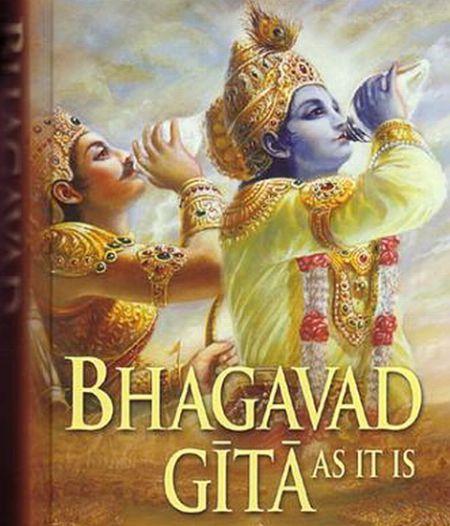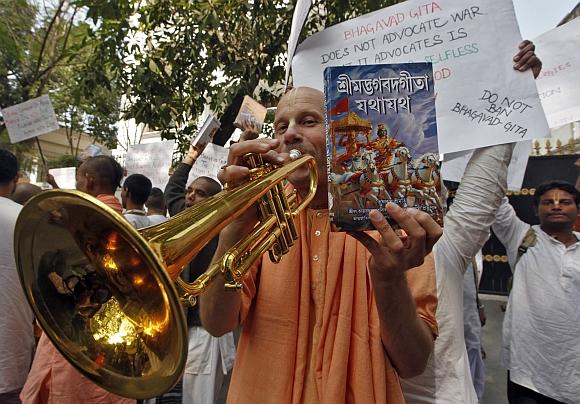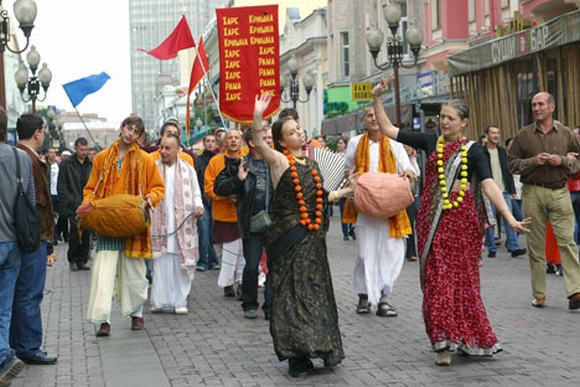Toral Varia Deshpande in Mumbai
The Bhagavad Gita has lasted for centuries and will continue to last for centuries regardless of what a court in Siberia has decided, says Bibek Debroy, who spoke to Toral Varia Deshpande.
A Russian court had on Wednesday rejected a petition by the Russian Orthodox Church which had sought a ban on a translated ISKCON version of the Bhagavad Gita. The case had created a storm in India and even parliamentary proceedings had been affected by it.
Apart from being a well-known economist, Debroy has come out with his version of the Mahabharat based on three unabridged translations of Ved Vyas's epic poem, as he wanted to "flesh out its myriad nuances", of which four volumes are out.
As an expert on Sanskrit and as someone who has read several versions of the Bhagavad Gita and Mahabharata, what is it that is controversial about the Russian translation of the epic?
I haven't read the Russian translation. I am of course familiar with the ISKCON (International Society for Krishna Consciousness) Prabhupada translation of the Gita and I find absolutely nothing in that translation remotely interpreted as extremist. In fact, I think Gita is one of the most tolerant scriptures around.
The group that had sought a ban on the Russian translation of Gita has termed the Russian translation as 'extremist' and 'sowing social discord'.
I think it is ridiculous because as I said, there are certain texts in Hinduism that one might say are intolerant but the Bhagavad Gitais not one of those. The Bhagavad Gita is remarkably tolerant. I am familiar with the English translation of ISKCON and I may differ a bit on the interpretation that they have put on certain 'shlokas' but those are matters of detail. In substance there is nothing that can be remotely interpreted as extremist or intolerant in the English version of ISKCON of the Bhagavad Gita.
There are millions and millions across the globe who follow the Bhagavad Gita or try to live by the principles of the Bhagavad Gita, isn't it?
I can argue, and indeed convincingly argue, that there are certain sections of Christianity, certain books in Christianity, including the Bible, which are extremely intolerant. Now, if I subscribe to one of those intolerant views I might find a tolerant view of the religion to be unacceptable.
So therefore it is perfectly possible that some silly court, and I am deliberately using the adjective silly, might decide that the Bhagavad Gita is unacceptable. But the Bhagavad Gita has lasted for centuries and will continue to last for centuries regardless of what a court decides.
...
'Don't think war setting has anything to do with action on Gita'
Image: A member of the global Hare Krishna sect during a protest outside the Russian consulate in KolkataDo you think that the Bhagavad Gita should be declared as a national book?
Well, the word secularism is an expression that is there in our Constitution, but it's an expression that we have never quite precisely defined. It's an expression that we are still trying to come to terms with, still trying to grapple with it. But regardless of the faith you profess, you will find the Bhagavad Gitato be extremely tolerant. By this I do not think that the Bhagavad Gita in any sense should be decreed to be a national religious text.
But nonetheless, the context of the Bhagavad Gita essentially distils out the wisdom of the Upanishadas and the six schools of the Hindu philosophy. And these, as I said, are remarkably tolerant. You can find whatever you want in the Upanishads and therefore in the synthesis of Upanishads which is the Bhagavad Gita.
Could you please elaborate what you mean when you say that there are certain sections that may be considered to be intolerant but those are not in the Gita itself? Also, the fact that the Gita has a war setting, do you think that is something that could have contributed to the perception of being intolerant?
No, I don't think that can be the basis at all. If you look at the Bhagavad Gita, and one would have to get into the specifics now. But the Bhagavad Gita, broadly speaking, talks about the three paths to salvation. One is the 'gyanyog' which is essentially the path of knowledge, which is when I search for knowledge and search for fruits within myself. The second part is 'karmayog', which is the path of action. Action, according to the Bhagavad Gita, is devoid of fruits of that action.
The third part of the Bhagavad Gitais 'bhaktiyog'. This is recommended in the Bhagavad Gita because 'gyanyog' and 'karmayog', are difficult and they are not accessible to all sections of the society and therefore the Bhagavad Gita says 'bhaktiyog' is the recommended course of action for particularly women or to the lowers sections of society that do not have access to 'gyanyog' and 'karmayog'.
If you read the Bhagavad Gita, across the 18 chapters of the Gita, you will find emphasis towards the later sections on 'bhaktiyog'. The reason I am saying this is that I don't think the war setting would have anything to do with the action on the Bhagavad Gita being taken by the court in Siberia. What they might take an unwarranted objection to is the belief towards the end of the Bhagavad Gita. Here the emphasis is on the 'bhaktiyog' where it's said that you renounce all paths and seek salvation in Krishna.
I can find similar sections in the Bible, in the Old Testament, not so much in the New Testament. But I have to take all this in context and a large chunk of the Bhagavad Gita, which is also about 'gyanyog' and 'karmayog'. I don't think the war setting is the relevant part. I am not a court in Siberia, but perhaps it's the emphasis on the later part where 'bhaktiyog' is recommended as the path to seek salvation in Krishna.
...
'As a country we should have taken tougher action'
Image: ISKCON followers in RussiaSo in your opinion it is more a case of misinterpretation of the text?
Yes, you are absolutely correct. I don't think the war part of it is relevant at all. In the Bhagavad Gita, except for in the first chapter, there is no reference to the war. And the references to the war are only in parts. I don't think the court in Siberia was looking at all of Mahabharata.
The Indian government sent out a red alert long before the issue started gaining momentum.
There are two levels at which we will respond. At one level, the individual level, I don't think I give a damn about what was being fought in a court in Siberia. It's completely irrelevant, because, as I said earlier, the Bhagavad Gita has stood the test of time and will continue to regardless of what a silly court in Siberia did.
At a country level, however, I think this has a bearing on the fact that as a country we don't seem to take any hard or concrete action. Personally, while I think I don't care what a court in Siberia has done, but at a country level I think action should have been a bit tougher.
...
'Credibility of the Russian government will be damaged'
Image: The ISKCON temple in St Petersburg, RussiaYou feel that the action could have been tougher. But if you were to suggest, what sort of action should India have taken and have not taken?
I don't think this is something where one needs to say, 'look we are going to impose nuclear sanctions on Russia because of this'. At the governmental level all that was required was for either the minister of external affairs or the prime minister, when he had recently gone to Russia, to say, hey look this is what is happening and we think this is very serious and you better look at it.
The spokesperson for the Russian envoy has already made a statement that they respect the Gita as a sacred text and that they are not opposed to the text in any manner.
As far as I can make out from news reports, the ambassador has only voiced his personal opinion. As far as I can understand, it hasn't translated yet in terms of any action that the Russian government has taken. So until the Russian government takes this seriously, the ambassador's opinion remains purely an opinion.
And what would the ideal action be?
Essentially, the ideal action by the Russian government would be the withdrawal of the case. I don't think there will be any damage done to India or the Bhagavad Gita. The damage really will be to the credibility of the Russian government.





article